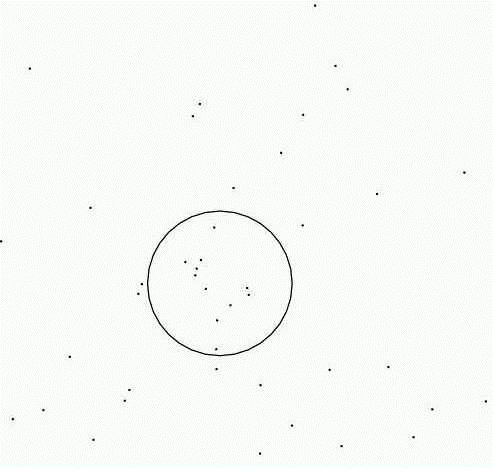Description
You are given N points in the xy-plane. You have a circle of radius one and move it on the xy-plane, so as to enclose as many of the points as possible. Find how many points can be simultaneously enclosed at the maximum. A point is considered enclosed by a circle when it is inside or on the circle.

Fig 1. Circle and Points

Fig 1. Circle and Points
Input
The input consists of a series of data sets, followed by a single line only containing a single character '0', which indicates the end of the input. Each data set begins with a line containing an integer N, which indicates the number of points in the data set. It is followed by N lines describing the coordinates of the points. Each of the N lines has two decimal fractions X and Y, describing the x- and y-coordinates of a point, respectively. They are given with five digits after the decimal point.
You may assume 1 <= N <= 300, 0.0 <= X <= 10.0, and 0.0 <= Y <= 10.0. No two points are closer than 0.0001. No two points in a data set are approximately at a distance of 2.0. More precisely, for any two points in a data set, the distance d between the two never satisfies 1.9999 <= d <= 2.0001. Finally, no three points in a data set are simultaneously very close to a single circle of radius one. More precisely, let P1, P2, and P3 be any three points in a data set, and d1, d2, and d3 the distances from an arbitrarily selected point in the xy-plane to each of them respectively. Then it never simultaneously holds that 0.9999 <= di <= 1.0001 (i = 1, 2, 3).
You may assume 1 <= N <= 300, 0.0 <= X <= 10.0, and 0.0 <= Y <= 10.0. No two points are closer than 0.0001. No two points in a data set are approximately at a distance of 2.0. More precisely, for any two points in a data set, the distance d between the two never satisfies 1.9999 <= d <= 2.0001. Finally, no three points in a data set are simultaneously very close to a single circle of radius one. More precisely, let P1, P2, and P3 be any three points in a data set, and d1, d2, and d3 the distances from an arbitrarily selected point in the xy-plane to each of them respectively. Then it never simultaneously holds that 0.9999 <= di <= 1.0001 (i = 1, 2, 3).
Output
For each data set, print a single line containing the maximum number of points in the data set that can be simultaneously enclosed by a circle of radius one. No other characters including leading and trailing spaces should be printed.
Sample Input
3
6.47634 7.69628
5.16828 4.79915
6.69533 6.20378
6
7.15296 4.08328
6.50827 2.69466
5.91219 3.86661
5.29853 4.16097
6.10838 3.46039
6.34060 2.41599
8
7.90650 4.01746
4.10998 4.18354
4.67289 4.01887
6.33885 4.28388
4.98106 3.82728
5.12379 5.16473
7.84664 4.67693
4.02776 3.87990
20
6.65128 5.47490
6.42743 6.26189
6.35864 4.61611
6.59020 4.54228
4.43967 5.70059
4.38226 5.70536
5.50755 6.18163
7.41971 6.13668
6.71936 3.04496
5.61832 4.23857
5.99424 4.29328
5.60961 4.32998
6.82242 5.79683
5.44693 3.82724
6.70906 3.65736
7.89087 5.68000
6.23300 4.59530
5.92401 4.92329
6.24168 3.81389
6.22671 3.62210
0
Sample Output
2
5
5
11
SOLUTION:
这题用来当模板
已经知道半径为1
O(n^3)的做法:
枚举任意两点为弦的圆,然后再枚举其它点是否在圆内。
用到了两个函数
atan2反正切函数,据说可以很好的避免一些特殊情况
O(n^2log(n))
这个类似扫描线的做法,以每一个点为圆心化圆,枚举与其相交得圆,保存交点和角度,按角度排序后,扫一遍。
CODE:
以下为第二中做法
#include <iostream>
#include<cstdio>
#include<cstring>
#include<algorithm>
#include<stdlib.h>
#include<vector>
#include<cmath>
#include<queue>
#include<set>
using namespace std;
#define N 310
#define LL long long
#define INF 0xfffffff
const double eps = 1e-8;
const double pi = acos(-1.0);
const double inf = ~0u>>2;
struct point
{
double x,y;
point(double x = 0,double y =0 ):x(x),y(y) {}
} p[N];
struct node
{
double ang;
int in;
} arc[N*N];
double dis(point a,point b)
{
return sqrt((a.x-b.x)*(a.x-b.x)+(a.y-b.y)*(a.y-b.y));
}
int dcmp(double x)
{
if(fabs(x)<eps)return 0;
else return x<0?-1:1;
}
bool cmp(node a,node b)
{
if(dcmp(a.ang-b.ang)==0)
return a.in>b.in;
return dcmp(a.ang-b.ang)<0;
}
int main()
{
int i,j,n;
while(scanf("%d",&n)&&n)
{
for(i = 1 ; i <= n; i++)
scanf("%lf%lf",&p[i].x,&p[i].y);
int g = 0;
int ans = 0,maxz = 1;
for(i = 1; i <= n ; i++)
{
ans = 0;
g = 0;
for(j = 1; j <= n ; j++)
{
if(dis(p[i],p[j])>2.0) continue;
double ang1 = atan2(p[i].y-p[j].y,p[i].x-p[j].x);
double ang2 = acos(dis(p[i],p[j])/2);
arc[++g].ang = ang1-ang2;//这里角度的算法很巧妙
arc[g].in = 1;
arc[++g].ang = ang1+ang2;
arc[g].in = -1;
}
sort(arc+1,arc+g+1,cmp);
//cout<<g<<endl;
for(j = 1 ; j <= g;j++)
{
ans+=arc[j].in;
maxz = max(maxz,ans);
}
}
printf("%d
",maxz);
}
return 0;
}